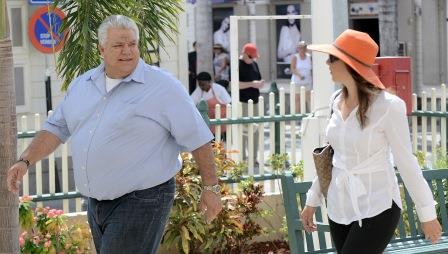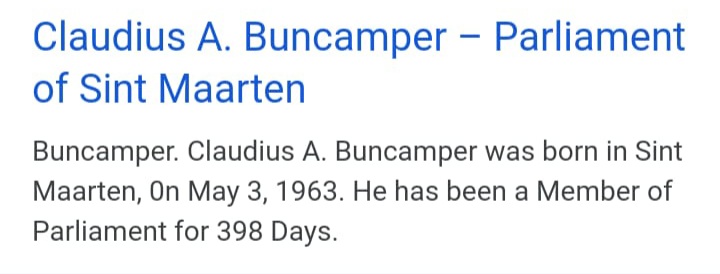
SUPREME COURT OF THE NETHERLANDS
CRIMINAL CHAMBER Number 19/05275 A
Date March 16, 2021 JUDGMENT:
The appeal in cassation against a judgment of the Common Court of Justice in the criminal case against CLAUDIUS BUNCAMPER,
born in ST MAARTEN on MAY 3RD 1963,
hereafter: the suspect.
The Advocate General DJMW Paridaens has concluded that the contested decision should be set aside and the case should be referred back to the Common Court of Justice of Aruba, Curaçao, Sint Maarten and Bonaire, Sint Eustatius and Saba, in order to reopen the existing appeal. to be tried and settled.
2Assessment of the appeal
2.1
The ground for cassation complains, among other things, that it cannot be deduced from the evidence used that the suspect actually gave direction to the cumulative / alternative actions of the legal person mentioned in the proven statement in the case concerning the summons with number 100.00464 / 14 under 1. .

2.2.1
The following have been declared against the accused in that case:

“That [A] NV on or about October 7, 2011 and November 30, 2012 in Sint Maarten, while [A] NV is / was obliged under the General National Ordinance Land Taxes to make profit tax returns within the specified period, deliberately the filed incorrect and incomplete profit tax returns for the years 2009, 2010 and 2011 submitted in the name of [A] NV, after all, [A] NV has always intentionally declared an incorrect and too low amount of taxable profit, while the result could always be are that disadvantage for the country of Sint Maarten could arise, to commit which offenses he, the accused, actually led. ”
2.2.2
This proven statement is based on the following evidence:

“Insofar as the evidence included below is referred to as” appendix “, it concerns appendices to the official report of the Tax Authorities Sint Maarten, Section Intelligence & Investigation, file number 1403, drawn up in the legal form and closed on 21 November 2014 and signed by [Reporting officer 1], employee of the Sint Maarten tax authorities, Intelligence & Investigation Section, also working as an extraordinary police officer.
In so far as documents are used, they are only used in conjunction with the content of other evidence relating to the same fact or facts.
- Writings: appendices D-009, D-010, D-011, being the profit tax returns for 2009, 2010 and 2011 respectively of [A] NV
- An official report of the interrogation, appendix G06-01, drawn up in the legal form and concluded on 8 July 2015 and signed by [reporter 1], employee of the Sint Maarten Tax Office / Intelligence & Investigation Section, also working as an extraordinary agent by the police and by [reporting officer 2], special agent of the police, as a financial investigator working for the Sint Maarten Cooperation Team Criminal Investigation Team, insofar as this includes, as a statement by [involved person 1]:
The only person I dealt with regarding [A] was [co-defendant]. [A] had no business activities, only the rental of a piece of land. I have drawn up the annual figures on the basis of the accounts that [fellow suspect] sent me. I have not checked the numbers. I have printed the 2009 and 2010 annual accounts in the name of [A] NV and sent it to [co-suspect]. I have not really discussed the financial statements with her. There have never been any discussions about it. I then completed the profit tax return in the name of [A] on the basis of the annual figures drawn up by me. I gave the report to [co-suspect] and she will have sent him.

I am not aware of the lease agreement you have shown between [A] NV and [B] NV (Court: [B]). I now see the name [B] as a tenant for the first time. I see that a monthly rental amount of USD 18,750 has been agreed. That is USD 225,000 on an annual basis. If I had seen this agreement, I would have recognized an amount of USD 225,000 as revenue.
- The statement of the suspect [co-suspect] as recorded in the official report of interrogation dated 28 October 2014, page 9 to the question: Who took care of the administration for [A] NV ?:
“I did that”.
- An official report, appendix V05-01, drawn up in legal form and concluded on 4 November 2014 and signed by the aforementioned [reporter 1], insofar as this includes, as a statement by [person concerned 2]:
Question: on April 1, 2008, the Island of Sint Maarten granted [suspect and co-suspect] the right of long lease. Who was using the plot at that time?
Answer: The plot was at that time in use by [B] NV I do not know the name of the company exactly. [person concerned 3] was the director. He had been there for a few years. [suspect and co-suspect] had first rented the plot.
Question: What can you tell us about the intermediate NV?
Answer: In our jargon it is a kind of “straw construction”. You slide a dummy NV in between, as it were.
Question: Who took care of this as you call it dummy NV?
Answer: As a civil-law notary I establish this NV. The customer, in this case, [suspect], then comes with his front man. This was [person concerned 4].
Question: Who ultimately became the owner of [A] NV?
Answer: It was intended that [suspect and co-suspect] would remain the Beneficial Owner of the dummy NV and therefore of the beneficial ownership. It’s a straw construction.
Question: Shown is the bearer certificate, appendix 0-070. Who was this certificate issued to at the time?
Answer: Yes, so you are still the beneficiary owner of the entire situation. The person who owns the bearer share is the owner of the company. It was intended that [suspect] would have it. I have provided it to [suspect].
- An official report, appendix G02-01, drawn up in legal form and concluded on September 25, 2014 and signed by the aforementioned [reporter 1] and by [reporter 2], special agent of the police, as a financial investigator working for the Criminal Investigation Cooperation Team Sint Maarten, insofar as containing, as a statement of the co-suspect [involved party 3]:
Question: Why did [B] not immediately buy the right of leasehold?
Answer: [suspect and co-suspect] did not want to sell it. They wanted to rent out but that was not allowed. They rented from the Island and were not allowed to sublet. It was intended that from the beginning in 2005 we would pay rent to [suspect and co-suspect], but that was not possible and for that reason a construction was devised. [suspect and co-suspect] then came with [A] NV.
- An official report of interrogation, dated 4 June 2015, drawn up by mr. MJ de Kort, examining magistrate charged with the handling of criminal cases in this court, insofar as this includes, as a statement by [involved person 2]:
[suspect and co-suspect] visited me because they had a number of problems with the right of long lease that was granted to them with regard to the plot at [a-straat 1]. During that conversation, it turned out that the plot had already been rented out, even before the deed was executed. The plot was leased to [involved party 3] or his NV, of which he is director. According to the leasehold conditions, the plot may not be (sub) let.
During the aforementioned conversation, a second problem came up, namely that [suspect and co-suspect] had already been receiving rental income from [involved party 3] or his company for some time. This rental income fell into their income sphere. For this problem, [suspect and co-suspect] wanted a technical tax solution. I note that if the rental income falls within the income sphere of [suspect and co-suspect], it means that they owe tax on it. [suspect and co-suspect] could no longer receive rent and they had to get rid of the (whether or not verbal) lease with [involved person 3]. I then proposed to [suspect and co-suspect] to find a buyer. The legal entity did not need the money, but will buy it. So the advice was to transfer the beneficial ownership to an intermediary. The intermediary is then authorized to rent to [involved party 3] or his company. [A] would buy the beneficial property. I asked my secretary to give the share to [suspect], from whom I received the payment that was used for the payment in full. ”
2.2.3
The court further considered the following with regard to the proven statement:
“[Suspect and co-defendant] (the Supreme Court understands: the defendant and his co-defendant) are accused of actually giving guidance to [A] deliberately incorrect and incomplete filing of the 2009, 2010 and 2011 profit tax returns. The ministry has argued in that regard that from December 2008 [A] has the economic ownership of a right of leasehold, that [A] annually pays a ground rent of NAf 18,492 to the land, which [A] has the land subject to leasehold rents and receives monthly rent for this amount of USD 18,750.00, that this rental income has not been accounted for in the profit tax returns of [A] and that these returns have therefore been made incorrectly and / or incompletely.
[suspect and co-suspect] have argued that in [A] no activities took place other than the lease of the land subject to long lease to [B], and that the rental income received in this respect was taken into account in the profit tax returns. Upon request, [suspect and co-suspect] presented the profit tax return for the year 2009 to the Court. This has shown the Court that a loss has been indicated here. Now that only the rental activities to [B] take place in [A], the rental income from it amounts to USD 225,000 annually, and the costs for the ground rent and the salary of the sole employee [involved 4] together would have amounted to at most USD 30,000, [ A] have had to declare a significant profit annually. However, this did not happen, so that the Court finds it proven that the profit tax returns for 2009, 2010 and 2011 were incorrect and incomplete. This judgment is confirmed in the statement of the tax advisor [involved person 1], who completed the profit tax returns on the basis of the information provided by the suspect. This is because [person concerned 1] stated that he was unaware of a lease and that the annual rental income of USD 225,000 was not included in the returns.
Since [A] did not declare the rental income or only for a small part, as a result of which the taxable profit was incomplete and incorrectly stated, Sint Maarten could therefore miss out on tax income.
The Court deduces the intent of [suspect and co-suspect] to incorrect and incomplete filing of profit tax returns from the circumstance that [suspect and co-suspect], in consultation with the civil-law notary [involved person 2], have knowingly set up a financial construction, whereby the rental income were no longer enjoyed in private by [suspect and co-suspect] but by the company controlled by him and his co-suspect [A]. However, by not passing on this rental income to the tax adviser [involved person 1] who completed the profit tax returns for [A], [suspect and co-suspect] had the intention of making these returns incorrect and incomplete.
Both suspects were closely involved in the course of events within [A]. For example, the civil-law notary [involved party 2] stated that he had discussions with both suspects about the financial arrangement to be set up in which [A] was deliberately placed between them and [B], that it was intended that both suspects would be the beneficial owners of [A], that the suspect came up with ‘straw man’ [involved person 4], and that the suspect has obtained the bearer share in [A]. Furthermore, the tax advisor [involved person 1] stated that the co-suspect [co-suspect] was his only contact person with regard to drawing up the annual accounts and the tax returns of [A], that the co-suspect [co-suspect] made decisions with regard to [A] and that she consulted with third parties.
2.3
The following legal provisions are important in cassation.
- Article 49 of the General National Ordinance on Land Taxes, as it read at the time of the proven fact:
“1. With imprisonment of up to six months or a fine of up to NAF. 25,000, – or, if the under-levied tax is higher than this amount, at most once the amount of the under-levied tax, or with both penalties, if the act or omission could result in disadvantage for the Netherlands Antilles or for one of the island territories may arise, the person who is obliged by virtue of this national ordinance to:
making a declaration within a set term, which is not filed within the set term, is incorrect or incomplete;
b. the provision of information, data or instructions, and does not provide these, incorrectly or incompletely;
c. providing data carriers or their contents for inspection, and making them available for this purpose in a false or falsified form;
d. to keep records in accordance with the requirements set in the tax ordinance, and do not keep such records;
e. storing data carriers, and not storing them;
f. cooperating as referred to in Article 43, paragraph 5, and does not provide this cooperation;
g. providing the statement as referred to in Article 45, paragraphs 2 and 3, and not providing this statement.
- Anyone who is deliberately guilty of an offense as described in the first paragraph, will be punished with imprisonment of no more than four years or a fine of no more than NAF. 100,000.00 or, if the under-levied tax is higher than this amount, at most twice the amount of the under-levied tax, or with both penalties.
- Subsections 1 and 2 shall not apply if the person on whom the obligation rests still submits a correct and complete declaration or provides correct and complete information, data or instructions before he knows or should reasonably suspect that the Inspector or one of the 48, second paragraph, officials and persons referred to as the inaccuracy or incompleteness is or will become known.
- Article 53 of the Criminal Code of the Netherlands Antilles, as it read at the time of the proven fact:
“1. Criminal offenses are committed by natural and legal persons.
- If an offense is committed by a legal person, criminal proceedings may be instituted and the sanctions provided for in general regulations may, if appropriate, be pronounced:
a. against that legal person or
b. against those who have ordered the offense, as well as against those who have actually directed the prohibited conduct, or
c. against those mentioned in parts a and b together.
- For the purposes of the first and second paragraphs, the following are equated with the legal person: the company without legal personality, the partnership, any other association of persons, and the special purpose capital. ”
2.4
The following must be assumed when assessing the appeal in cassation. Article 53 of the Criminal Code of the Netherlands Antilles is identical to Article 51 of the Dutch Criminal Code. In its judgment of 26 April 2016, ECLI: NL: HR: 2016: 733, the Supreme Court considered the following with regard to the latter provision:
“3.5.1. (…) [N] after it has been established that a legal person has committed a certain criminal offense, it is raised whether someone, as de facto manager, is criminally liable for this. In assessing this, it must be assumed that it follows from the linguistic meaning of the term de facto management, on the one hand, that the mere circumstance that the accused is, for example, a director of a legal person, is not sufficient for him to be regarded as the de facto manager of a committed by that legal person. criminal act. But on the other hand, such a legal position is not a requirement, while someone who is not employed by the legal person can also be the actual supervisor of an offense committed by the legal person.
The same criminal offense can be given factual direction – jointly or otherwise – by more than one person. A legal person can also be a de facto manager.
3.5.2.
Actual leadership will often consist of active and effective behavior that is unmistakably within the ordinary meaning of the term. There may also be actual management if the prohibited conduct is the inevitable consequence of the general policy pursued by the suspect (for example as a driver). Consideration could also be given to making such a contribution to a complex of behaviors that led to the prohibited conduct and taking such an initiative in this regard that the suspect must be deemed to have given actual direction to that prohibited conduct. It is not required that another person has performed the physical executing acts.
Under certain circumstances, a more passive role may also lead to the judgment that a prohibited behavior has been promoted in such a way that it can be regarded as actual leadership. This may in particular be the case with the suspect who is authorized and reasonably obliged to take measures to prevent or terminate prohibited conduct and who refrains from taking such measures. ”
2.5
The statement of proof, stating that the suspect has actually given direction to the proven behavior of [A] NV, consisting of making incomplete and incorrect reports, cannot be deduced from the content of the evidence used. The decision is therefore insufficiently motivated. In doing so, the Supreme Court takes into account that the Court of Appeal has not established whether, and if so to what extent, the suspect was involved in the filing of the profit tax returns for 2009, 2010 and 2011 by [A] NV. the co-defendant has had the financial construction set up with [A] NV and that they both had far-reaching involvement in the course of affairs within [A] NV – in the light of what has been stated above under 2.4 – cannot bear this proven statement.
Insofar as the appeal in cassation complains about this, it succeeds.
2.6
In view of the decision that follows below, discussion of the remainder of the appeal is not necessary.
3Decision
The high Council:
- set aside the contested decision, insofar as it is subject to the judgment of the Supreme Court as set out above under 1;
- remits the case to the Common Court of Justice for a re-trial and settlement.
This judgment was delivered by Vice President V. van den Brink as Chairman, and Counsel Y. Buruma and JCAM Claassens, in the presence of the Acting Registrar HJS Kea, and delivered in open court on March 16, 2021 .
